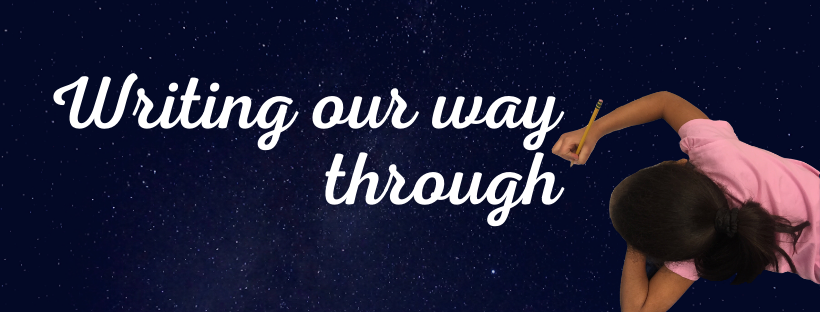This essay was first published on Vanessa Mártir’s blog, Digging Into Memory.
It was a hard teaching week. High school students can be so callous, and I’m a hard teacher who demands a lot from my kids and sometimes that causes problems. But know this: I am here, working with this demographic, because I want to be. I could go to a private school and work with the rich, white kids, but I know where I’m needed—in the neighborhoods like the one I grew up in in Brooklyn, with kids that look like me and come from homes that look like mine did. And no, that doesn’t make me heroic. It makes me someone who cares, who wants to make a difference. I have to remind my students that no, they’re not indebted to me, but yes, I give a fuck and this is about so much more than a college essay or a poetry or fiction class. This is about preparing them for life. Their lives. I’m just trying to show them that they’re magic…
I’ll call her Mia. She’s a senior now and I’ve been working with her in some capacity since her first year in high school. Various writing classes, a poetry class she signed up for but rarely came to, a mandatory writing class one summer, a social action writing class.
She always had a little bit (no, a lot) of attitude but she’s also brilliant—her comments in class are well thought out and eloquent, she makes interesting connections; when she does her work, she does it well. But she’s a trigger. You never know what’s going to pull that clip out of the grenade that she is. This week, that grenade went off and the shrapnel came rushing at me.
I teach seniors how to write the college essay—both the personal statement and supplemental essays many universities require in addition to the common and SUNY apps. I tell my students that the essays are the gates. Their statistics get them to those gates: their grades (GPAs), SAT and/or ACT scores, recommendations, etc., get them to the gates of the university of their dreams, but it’s the essay(s) that will open those gates or keep them closed.
That essay is the only place admissions officers see you, the student, not just the numbers. It’s the one place applicants can show who they really are, what they care about, how they think and exist in the world, what matters to them and why. It’s the one place they can show their hearts. It’s that important.
I take this class seriously. It’s often the first class these students have ever taken where they’re asked to share themselves, their lives, their stories. It’s often the first time they can, must write about themselves. For their entire academic careers, they’ve been told not to use the “I” in essays, not to write their opinions or their stories, and now, doing just that in an essay, determines where they will spend the next four years of their lives. So much of what I do is teaching them to unlearn what they have learned. The class is also an entry into college level writing.
These students are all students of color, with few exceptions. Dominican, Mexican, Ugandan, Jamaican, Chinese, Nepalese, Pakistani. They are applying to SUNY schools and private universities where, for the first time in their lives, they will be the one black or brown face in a sea of white faces. It will be the first time they will be in white America without having the escape of going back home that evening. They will be surrounded by white professors and white students and all that whiteness is and means. They will be the other, and I am scared for them.
This fear makes me a hard ass. I am strict with my students. I demand excellence. I push them to go further, to write more, to dig. I hold them accountable for their behavior. I don’t stand for lateness or laziness or half-assness. I push them hard while also working to show them that they can trust me and that I care. This week a draft of their essays was due. I bought them chocolate to munch on while they wrote.
My style of teaching (an iron hand with a velvet glove) works with most of my students, though there are exceptions. Still, I’ve had so many return to visit and thank me for what I taught them. They tell me I was right about what I’d said to them. They share the papers they’ve written, the big As circled in red ink, “Great job!” in the margins. It’s when they go out into the world that they get it and me.
My style didn’t work with Mia this week. She apparently felt targeted and reproached, and she acted out.
To her it didn’t matter that she walked in late. “Oops,” she said and rolled her eyes when I asked her why she was so late. She walked in with two friends who don’t go to school with her. That looks suspect and I told them as much. “So?” she said. I let it slide. You have to pick your battles.
She sat and didn’t do any work. This young woman who is applying to UC Berkeley’s Engineering Program Early Action. Whose entire application, including the personal statement and supplemental essays, is due on October 29, sat there and didn’t do anything. When I tried to relay the urgency, probably already in my losing patience voice, she snapped. I tried. I can honestly say that I tried, but when she told me that she had to leave early for an orientation, I said, “You have done no work. You came late and now you tell me you have to leave early?” She responded, “What does that have to do with anything?” A back and forth ensued. Yes, I get it. I am the adult. I should not have engaged in a back and forth, but you know what, I’m a human being who cares about this kid and doesn’t want to see her fail. I understand that her behavior is self-defeating and problematic and will get her in trouble out in the real world, the white world that she’s heading to in Berkeley, California…that’s if she ever gets that app done.
“Why do you think it’s okay to talk to me like that?”
“You’re not my mother.”
“But I’m your teacher.”
“And?” That’s when I asked her to leave. This young black woman who is so smart and has such a promising future if she would just get out of her own way.
I think about what will happen if she pulls that stunt out in the world. If she does that to a professor who doesn’t care about her, isn’t invested in her future.
Excellence. I demand excellence. Will it protect her from the microaggressions and racism she is sure to encounter? No. Sadly, no. But I’m trying to help her see her own magic so she can learn to protect herself. To see her own beauty. To see what she is capable of so when they lean in and try to tell her otherwise, she can push back because she knows who the fuck she is, the strength she has chiseled into her backbone like hieroglyphics on pyramid walls.
***
I think of Claudia Rankine’s Citizen…
…you are reminded that a friend once told you there exists a medical term—John Henryism—for people exposed to stresses stemming from racism. They achieve themselves to death trying to dodge the build up of erasure. Sherman James, the researcher who came up with the term, claimed the physiological costs were high. You hope by sitting in silence you are bucking the trend.
***
Has my achieving saved me from the claws of racism and the cicatrixes they leave behind? I remember all those times I’ve been made to feel less than and not enough. That professor who said, “You people…” and let the door slam, like a casket, a cage, a vault.
Clarissa Pinkola said: “if you have a deep scar, that is a door; if you have an old, old story, that is a door. If you yearn for a deeper life, a full life, a sane life, that is a door.” (Women who Run with the Wolves)
I am trying to show my students my door so they can learn to construct their own…
***
This week I went to the Dominican spot to get myself some lunch before heading out to teach and write and lesson plan, etc. An African-American man was placing an order for several trays of whole chickens for pick up on Saturday. The women struggled to communicate with him so I stepped in to help, being apparently the only English speaker there. Man is smiling and thanking me for helping. Bottle blonde Dominicana behind counter says he has to pay in advance. Man has no problem. Steps out to confirm order with someone on the phone. Blonde Dominicana says she doubts he’ll be back. I ask why. She says she doubts he can afford the $100+ order. I ask again why. I stare, accusingly. She flutters her eyelids nervously. Me: “¿Porque es moreno?” She huffs and walks off to take another order. This is the same woman who makes my coffee in the morning, perfectly, without me having to ask. The African blood in her is undeniable, obvious in her hair and skin and curve of her nostrils, and here she is being racist. Le debe de dar vergüenza. My people make me so ashamed sometimes. (That man did come back and paid for his order of ten whole chickens, by the way.)
I think about Mia and the racism she’s probably already encountered from her own people, because she’s black and she’s beautiful and smart and has some serious attitude. I wonder what’s happened to her that she has built this armor around herself.
When I told my partner about what happened, she said, “Do you see yourself in her?” I winced. The undeniable answer is yes.
I remember the girl I once was who was so hurt and so angry and felt so unseen that I acted out. I was violent. I used my fists and legs. I pummeled. I kicked. But I also had books and I had writing. That was my door. It’d take me some time to find that out, but I know now that that’s what saved me. There are the roots to my resilience. It was books and words that saved me.
***
“Alone” by Maya Angelou
Lying, thinking
Last night
How to find my soul a home
Where water is not thirsty
And bread loaf is not stone
I came up with one thing
And I don’t believe I’m wrong
That nobody,
But nobody
Can make it out here alone.Alone, all alone
Nobody, but nobody
Can make it out here alone.There are some millionaires
With money they can’t use
Their wives run round like banshees
Their children sing the blues
They’ve got expensive doctors
To cure their hearts of stone.But nobody
No, nobody
Can make it out here alone.Alone, all alone
Nobody, but nobody
Can make it out here alone.Now if you listen closely
I’ll tell you what I know
Storm clouds are gathering
The wind is gonna blow
The race of man is suffering
And I can hear the moan,
‘Cause nobody,
But nobody
Can make it out here alone.Alone, all alone
Nobody, but nobody
Can make it out here alone.
***
I think of that scene in The Color Purple, where Harpo marries Sofia, and Mister goes up to congratulate Sofia. As he approaches, three of Sofia’s aunties stand in front of her, like a wall, a fortress, a moat around Sofia. They don’t let him get close to Sofia, as she holds her baby and rocks her body the way mommas do.
We can’t make it out here alone though we will try. It’s what we do. It’s how we try to shield ourselves from the heartbreak that life delivers. Pero mi gente, the most beautiful thing there is is family (blood or otherwise). The most human thing is to want companionship. To share our lives and be held when we are hunched over, the ache inside too much to stand upright.
It’s true, none of our achievements or our kindnesses or our living right will save us from the racism we will surely encounter. They will still want to make a stereotype out of you. They will still make you believe you are the exception and in the next sentence say you’re all the same. “You people…”
When you know you are magic, you can remind yourself. And when you have family to hold you, together you can pull yourself back upright again.
Vanessa Mártir, author, activist, and Teachers & Writers teaching artist, uses the incredible life story of Catherine Ferguson—a former slave and a famous baker—to teach young writers about the power and importance of details in a great lesson on autobiography. Although initially aimed at 4th graders, this vibrant lesson plan offers empowerment to emerging writers of any age.



